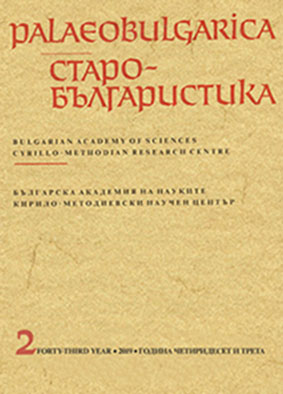Московские переводы библейских текстов с польского второй половины XVII в.: на стыке Средневековья и Нового времени
Muscovite Translations of Biblical Texts from Polish in the Second Half of the 17th Century: at the Junction of the Middle Ages and the Early Modern Period
Author(s): Tatyana Victorovna PentkovskayaSubject(s): Language studies, Language and Literature Studies
Published by: Кирило-Методиевски научен център при Българска академия на науките
Keywords: Biblical texts; Book of Job; New Testament; Psalter; translations from Polish
Summary/Abstract: The paper deals mainly with the translations of the biblical texts that appear in the Moscow Chudov monastery in the second half of the 17th century. They are fully or partially based on Polish sources. These are the Book of Job translated by hieromonk Moses (1671) and the arguments (summae) inserted into the New Testament translation made by a group of translators of the Moscow Print Yard under the leadership of Epiphanius Slavinetsky and Euthymius Chudovsky in the 1670–90s. In addition to these texts the translation of the Psalter made by Abraham Firsov in 1683 and the manuscript of the Psalter in three languages (Church Slavonic, Greek and Polish) which belonged to Simon Azarin should be noted. This group of translations is characterized by the following features: the use of Bible editions coming from translators belonging to different confessions (both Catholic and Protestant), which could be combined within a single translation, and the presence of forewords and a kind of critical apparatus. It should also be noted that some sources are multilingual. These are the Psalter of Simon Azarin (Church Slavonic-Greek-Polish interlinear) and the New Testament translation of Epiphanius Slavinetsky and Euthymius Chudovsky (two-column Slavic-Greek diglotta). The language of the Bible translations of the Chudov monastery milieu was determined by several factors, primarily the orientation both towards Greek models and grammatical rules. The emergence of Church Slavonic translations of primarily biblical texts from Polish literary language in confessionally different variants is a vivid manifestation of the changes in the Muscovite cultural and linguistic situation as a whole, regardless of the implementation of specific linguistic attitudes of their translators.
Journal: PALAEOBULGARICA / СТАРОБЪЛГАРИСТИКА
- Issue Year: 2019
- Issue No: 2
- Page Range: 67-74
- Page Count: 8
- Language: Russian
- Content File-PDF

